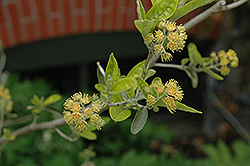It's all about ...
plants

Height: 6 feet
Spread: 6 feet
Sunlight:
![]()
![]()
Hardiness Zone: 8a
Description:
A semi-evergreen southern native shrub producing bright green leaves with silvery undersides, on an open habit; foliage smells like apple-banana when crushed; yellow-chartreuse flowers in early spring; drought tolerant once established
Ornamental Features
Alabama Croton features dainty racemes of yellow pincushion flowers with chartreuse overtones and light green bracts at the ends of the branches in early spring. It has green foliage with silver undersides which emerges light green in spring. The fragrant oval leaves turn an outstanding orange in the fall.
Landscape Attributes
Alabama Croton is an open multi-stemmed deciduous shrub with an upright spreading habit of growth. Its average texture blends into the landscape, but can be balanced by one or two finer or coarser trees or shrubs for an effective composition.
This is a relatively low maintenance shrub, and should only be pruned after flowering to avoid removing any of the current season's flowers. It is a good choice for attracting bees and butterflies to your yard. It has no significant negative characteristics.
Alabama Croton is recommended for the following landscape applications;
- Mass Planting
- Hedges/Screening
- General Garden Use
Planting & Growing
Alabama Croton will grow to be about 6 feet tall at maturity, with a spread of 6 feet. It has a low canopy with a typical clearance of 1 foot from the ground, and is suitable for planting under power lines. It grows at a medium rate, and under ideal conditions can be expected to live for approximately 30 years.
This shrub does best in full sun to partial shade. It is very adaptable to both dry and moist locations, and should do just fine under average home landscape conditions. It is particular about its soil conditions, with a strong preference for rich, alkaline soils. It is somewhat tolerant of urban pollution. This species is native to parts of North America.
This plant is not reliably hardy in our region, and certain restrictions may apply; contact the store for more information.
